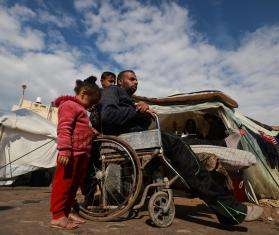When Jacir de Souza, an indigenous Macuxi leader in Brazil's Roraima state, was treated for COVID-19, it was not his first encounter with Doctors Without Borders/Médecins Sans Frontières (MSF). In the early 1990s, MSF came to de Souza’s community in the Amazon region as part of the response to a malaria epidemic. “They said, ‘We're going to help. We invited indigenous people from all over Roraima to be trained as lab technicians and microscopists,’” de Souza remembers. Many of the people MSF trained some 30 years ago continue to work in their communities to this day. “There was malaria throughout the state, and then [with the work] it was gone. It was really over!” During the COVID-19 pandemic, MSF has focused on the most vulnerable people in Brazil, including those in indigenous communities which often lack access to medical care. Our teams worked in Roraima state's Boa Vista field hospital, where de Souza received treatment and recovered, from June to September this year. Unfortunately, others close to him did not survive. “I did not expect it would be such a tough disease,” he says. “I lost my younger brother, I lost my mother-in-law, I lost my aunt. I don't know when this disease will go away.“
Search results
90% of our funding comes from individual donors. Learn how you can support MSF’s lifesaving care with a gift.
-
- Ways to Get Involved Discover the many ways you can support our lifesaving work
- Ways to Give Individuals like you provide 90% of our funding
- Fundraise We make it easy to raise money to support the MSF movement
- Friends of MSF Chapters Learn how to get involved with our university student groups
- Attend an Event Connect with the MSF movement
- Latest Campaigns Become a part of MSF’s most important lifesaving work today
© Médecins Sans Frontières 2024 Federal tax ID#: 13-3433452
Unrestricted donations enable MSF to carry out our programs around the world. While we try to honor requests to earmark, should we receive more gifts than we can use for a program, we will reallocate them where the needs are greatest.
For Donors
For Supporters
For Media
For Recruits
General Interest
© Médecins Sans Frontières 2024 Federal tax ID#: 13-3433452
Unrestricted donations enable MSF to carry out our programs around the world. While we try to honor requests to earmark, should we receive more gifts than we can use for a program, we will reallocate them where the needs are greatest.
We speak out. Get updates.
How we use funds
Your gift helps us provide medical humanitarian aid for hundreds of thousands of people each year.
Learn more83%
Programs
16%
Fundraising
1%
Management & General Admin




